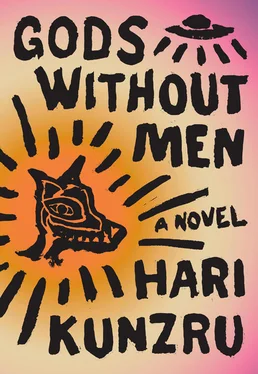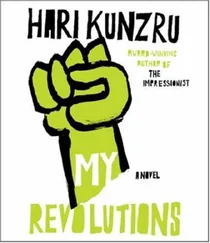After a long time, the university reopened. The family was very happy, because Baba was to be paid a salary again. With no car he had to get a ride with a colleague, and every morning he’d put on his suit and sit at the kitchen table with his briefcase, waiting for the man to arrive. Soon her mother was frantic with worry. The death squads were killing academics. First a lecturer from the sociology department, then the head of the College of Humanities. There seemed to be no reason. One of the dead was an old philology professor, a man whose only passion was ancient Aramaic manuscripts. Even Baba was shaken by that. “Akh laa!” he muttered, the telephone receiver still in his hand. “How could it happen? That one would never hurt a fly!” No one seemed to know who was behind it: SCIRI, the Interior Ministry, Mossad. Laila begged him to be careful. “Don’t worry,” he told her. “None of it has anything to do with me.” He said the dead men were probably involved in politics or the black market, but he didn’t look as if he believed it. Mama shouted, telling him to think about his family and not to speak out in public. He would often say things against the Americans, against members of the Governing Council. He just spoke however he pleased, as if it were a free country.
He took so many risks — with his job, his loose talk — but in the end it was the stupid neighbor who broke him. Mr. Al-Musawi was having problems with his TV reception. He accused their family of moving some electrical cable so that it ran near his aerial. It wasn’t true, of course. They’d never touched any cable. Al-Musawi and Baba would shout at each other over the wall, the neighbor demanding the power line be moved back to its old place, father retorting that they never had any electricity anyway, so what did it matter? Baba probably shouldn’t have insulted him. All the man wanted was to see his football or his variety shows or porn movies or whatever it was. When there’s a war, people cling on to little luxuries. Such things can become very important.
They couldn’t prove Al-Musawi was behind the raid, but another neighbor told Mama it was certainly him because he had a cousin who worked as an interpreter for the Americans. All he had to do was give their name. The soldiers came into the house and made the whole family kneel on the floor while they went into all the drawers and closets and threw everything around. They were shouting at Baba about being a terrorist, and wouldn’t listen when he told them he was nobody, just a teacher of history. Where are the weapons, they kept asking. He was begging them at least to treat his books kindly, but they were sweeping them off the shelves and taking whole handfuls of his papers and dumping them on the floor. Everyone was crying but somehow that was more upsetting than anything, seeing the papers he kept so neatly strewn all over the tiles. “You think I’m a terrorist?” he asked in English. “Look at this!” It was so silly. He was waving a DVD, some black-and-white American movie they’d watched the night before, about a scout leader who becomes a politician in the Senate. “You think this is what terrorists watch? You think so?” They put a hood over his head and took him away.
He was gone almost two weeks. It was a terrible time. At first, it was impossible even to find out where he was. There were horrific stories about what the Americans did in their prisons. As bad as Saddam, said one neighbor, before Mama angrily reminded him there were children in the room who could overhear. Finally one of her uncles had to take money in an envelope to some man at the Interior Ministry to get him out. He came home, unshaven and tired but saying he was OK. “Nothing happened,” he told Laila, as she clung to him, weeping fiercely. “It was just a little cold and dirty.” But he wasn’t the same afterward. He and Mama talked in low voices in the bedroom. He shuffled around the house like an old man.
That was when Mama started talking about leaving. When the phone was working, she spent long hours talking to her brother in America, ignoring Baba’s pleas to think about the bill. Laila and Samir weren’t allowed out, even to go to school. Samir had been asked by a classmate whether he was Sunni or Shi’a. He was so little, he didn’t even know the answer — before the war that kind of thing had never been a problem. Now it made their mother paranoid. She saw kidnappers everywhere. So they were stuck at home, watching TV when there was electricity, drawing and reading when there wasn’t. Along the street people were putting up signs saying their houses were for rent. Every day they seemed to hear about someone else who was leaving for Syria or Jordan. Baba said he didn’t want to leave, that Iraq was his country and it was his duty to stay and make it a decent place to live again.
Then, one Friday afternoon, he went out and didn’t come back. Her father’s corpse, waving good-bye at the door . The colleague he’d gone to visit said he’d never arrived. As it got dark, Laila tried to comfort her mother, who was crying uncontrollably. One by one the uncles arrived, bringing their families so they wouldn’t be left alone. The house was crammed; the whole clan was sitting by the phone, waiting for news, turning the air blue with cigarette smoke. That night no one slept. They assumed it was a kidnap, and some middleman would get in touch to demand a ransom. Instead, the next morning, there was a call from the police to say Baba’s body had been found dumped by the side of the road. On a garbage heap, they said. Her darling father, in the trash like a dead cat.
This time they couldn’t blame Al-Musawi. He’d taken his stupid television and left with the others. Someone drove to the morgue to get the body. Laila stayed with Mama and Samir, too numb to move from the couch.
They buried him immediately, bribing a guardian for a plot in the overcrowded cemetery. Laila wasn’t allowed to go. Three weeks after the murder, Mama told her to pack her things. Two suitcases had been bought at the market, a black one for Samir and a pink one for her. They were going to America, to stay with Mama’s older brother Hafiz. For how long, she asked. Until it’s safer, was the reply. Samir clung to Mama’s dress, pleading not to be sent away. She soothed him, telling him she’d follow as soon as possible, when she’d found a tenant for the house. She hugged Laila and told her to look after her brother. Then they got into the car, where Uncle Anwar was waiting to drive them across the border to Jordan. In Amman, they got a plane to the United States, sitting in their seats with their documents around their necks in big plastic wallets. At the other end, Uncle Hafiz and Aunt Sara were waiting.
It had been her first and only time in an airplane and she fell asleep on her cot in Wadi al-Hamam thinking about it, the novelty of the microwaved food, the movie playing on the little seat-back screen. Samir had been so young he got carried away with excitement. She’d hissed at him that it was wrong to be so happy after what had happened to Baba. He began to cry and the other passengers stared. The stewardess tried to cheer him up with coloring pencils and a little toy bear.
When she woke she wasn’t sure where she was. There was the sound of a helicopter flying overhead, a familiar dry heat in the air. Would there be electricity? Then she heard other people moving about and opened her eyes. No, not home at all. On the Marine base. She brushed her teeth in the shower block, feeling shy at being half dressed around so many strangers, all these women towel-drying their hair, putting sunscreen on their faces. She scuttled in and out as fast as she could, then slipped into a pair of black combats and a T-shirt and walked over to the canteen to get breakfast. The sun was already high in the sky. The hills looked almost white in the fierce light.
Читать дальше












